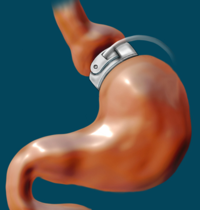
Photo from wikipedia
We read with particular interest the paper written by Erin K. Greenleaf et al. and published in March 2017 in Gastric Cancer [1]. Their paper reports a comparison of the… Click to show full abstract
We read with particular interest the paper written by Erin K. Greenleaf et al. and published in March 2017 in Gastric Cancer [1]. Their paper reports a comparison of the minimally invasive surgical approach to the open surgical approach in resectable gastric cancer patients with curative intent, focusing on what is currently the largest series of Western gastric cancer patients. We agree with the authors that minimally invasive surgical techniques are an emerging option in the staging and management of both early and advanced gastric cancer. Although much of the current knowledge about these approaches and their outcomes was obtained in Eastern countries, experience of them in the West is growing. Minimally invasive gastrectomy appears to have similar oncologic outcomes to open procedures, as Vivian Strong demonstrated in her recent published meta-analysis [2], and it has therefore become a useful alternative to open precedures that enables patients to return more quickly to their routine activities. However, we dispute the highly encouraging oncological outcomes described by the authors in their work because we note that a relatively high number of patients did not receive the correct treatment in terms of their oncological outcomes, particularly in the minimally invasive groups. Surgeons did not remove lymph nodes in 9.4% of the robotic procedures and 13.4% of the laparoscopic ones; in addition, one-third of the patients (32.7% in the robotic group and 33.3% in the laparoscopic group) who underwent a minimally invasive procedure did not undergo oncological staging because an insufficient number of lymph nodes (\15) were removed. We also note that the percentages of patients with stage III–IV gastric cancer who were treated using robotic, laparoscopic, and open approaches were the same.When the disease is at stage III–IV (particularly stage III), the gastric cancer guidelines state that a good D2 lymphadenectomy is needed to improve overall survival and disease-free survival. Stage III disease includes patients affected by a locally advanced gastric cancer that could benefit from curative surgery as a component of integrated therapy (i.e., with adjuvant or perioperative chemotherapy). Also, according to the 7th UICC Gastric Cancer Staging System, stage IV disease includes patients with positive cytology but without remote metastases and macroscopically evident peritoneal carcinomatosis. A curative D2 gastric resection performed within local and integrated treatment strategies can be carried out in such cases [3]. We believe that robotic and laparoscopic approaches can be applied in gastric cancer cases, but the oncological results obtained when these approaches have been used at an advanced disease stage have so far been poor and inconclusive. Minimally invasive gastric resection is currently the standard method applied in cases of early-stage cancer, as it has significant advantages in relation to shortterm and long-term oncological outcomes. Recently, the indication for a laparoscopic approach has been extended to locally advanced gastric cancer. Large-scale randomized controlled clinical trials are currently underway in Eastern patients to confirm its feasibility and safety in cases of more advanced gastric cancer. The application of a minimally invasive surgical approach could modify the extent of the surgery needed, reduce the risk of perioperative complications, and potentially yield better results in terms & L. Graziosi [email protected]
Journal Title: Gastric Cancer
Year Published: 2017
Link to full text (if available)
Share on Social Media: Sign Up to like & get
recommendations!